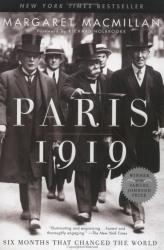I just finished Margaret McMillan’s book this week. It discusses the drafting of the Treaty of Versailles (and others) following World War I, led by Britain, France and the USA. The Austro-Hungarian empire and the Ottaman empire had both collapsed as the war ended, leaving many new ill-defined nation-states in their wake. The treaty was born of noble intentions: an idealistic American president wanted to do away with the old ways of diplomacy, and draw borders based on nationality and ethnicity rather than imperial ambitions, drawing on the language of “self determination”. Those ideals were diluted by the ambitions of the various European powers, by shifts in popular opinion back home for each country, and by simple inattention to countries outside Europe itself.
The author presents the material in context, and it’s very interesting to see the foundations laid for future conflicts, from World War II to Kosovo and Kurdistan. I found it fascinating to see so much of world politics interlinked. In one section, she describes Japanese aims at the conference: they wanted the new League of Nations to include racial equality as a founding principle, and they wanted to take over a German colony (Tsingtao) on the Chinese mainland, largely for their own imperial ambitions. Due to racism at home, the American delegation could not accept racial equality, but felt the need to placate Japan. So, they gave way on the principle of “self determination” in Tsingtao, and handed it over to Japanese control, where it proved valuable to later Japanese ambitions. To me, this speaks to the conflict between the purported ideals and actual behaviour on in the international stage. The USA is largely presented in a sympathetic light in this work, but the period also predates America’s true rise to power. The great powers of the age (Britain and France) are seen in a much harsher light, and their behaviour is strikingly similar to contemporary American action.
Yes, it’s a tough slog: you could describe the book as 500 pages of geographical and historical minutiae. But the content is compelling, and the writing keeps the pace moving by including details of the personalities and charisma involved in the negotiations themselves. I really enjoyed the book.


One Reply to “Paris 1919”